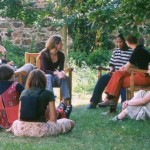When you least expect it… Where have you found disciples?
In the temple… Riding in a chariot along a dusty road… In several synagogues… On the side of a river… In a prison… Among a group of philosophers…
These are some of the many places and circumstances we find in Scripture in which followers of Jesus Christ encountered other disciples. In the examples above, the people encountered where not yet following Jesus (they were “lost”), but after hearing the gospel proclaimed by Peter, Phillip, Paul, or someone else, and after being transformed by the Holy Spirit, they became disciples (they were “saved”).
In each case, the disciples of Jesus were expecting to find other people who were being drawn to God by his Spirit. And, they found these people in (what I would consider) unexpected places. I mean, they don’t seem unexpected to us right now because we know the stories.
But, today, do we expect to find new disciples riding along a road? On the side of a river? Among a group of pagan philosophers?
So, what’s the point of this post? Thank you for asking.
I talk to people every week – sometimes several times in the same week – who are desperate for fellowship with other brothers and sisters in Christ. They recognize that God has created us to love him and love others and in to live in community with others who are in Christ. But, they are struggling to find people who are interested in that same kind of relationship.
So, what do I tell them? Well, I tell them to pray. And, I tell them to look around at the people that God has already brought into their lives. Are they expecting God to bring this kind of fellowship into their lives? It may be there already…
Sometimes, those brothers and sisters in Christ who God is bringing into someone’s life are not actually “in Christ” yet – as in the cases that I mentioned above. Other times, the people are already Christians and perhaps even recognize that something is missing in their walk with Christ without being able to recognize the lack of relationship with their brothers and sisters.
So, are you seeking fellowship in the Spirit? Look around. The Spirit may be leading you to people in unexpected places, situations, and circumstances.
Have you ever “found” a brother or sister in Christ in an expected place, situation, or circumstance? Can you share part of that story with us?
More about laughter, joy, and letting go
Yesterday, I published a post called “Be sarcastic with one another” as part of the May 2012 Synchroblog on the topic of “Lighten Up: The Art of Laughter, Joy, & Letting Go.”
The links to the other posts in the synchroblog were not available until last night. But, I’ve now added the links. So, if you want to read more about laughter and humor and theology and other stuff, use the link above to jump to my post. You’ll then find the links at the bottom.
A couple of the bloggers used humor in their own posts, like I did. But, most of them wrote about their own struggles or victories in the areas of joy and laughter. Several even wrote about the connection between laughter and theology. I also appreciated several of the posts that talked about the balance between seriousness and levity in life and the importance of considering the people around you.
So, if you wanna “lighten up,” jump over to my post and check out some of the other entries in the synchroblog.
Equipped by Itinerant Servants of God
One of my favorite passages of Scripture is Ephesians 4:7-16. After focusing on our unity in Christ in Ephesians 4:1-6, Paul turns to the great diversity among the body of Christ – all worked out by the Holy Spirit according to the grace of God.
But, as he comes to the end of that passage (Ephesians 4:16), Paul stresses that the diversity is not simply a demonstration of the myriad grace of God, it is also through all of the different (diverse) parts of the body of Christ that the Spirit works to build us all up – when we are all working together as God directs us and provides for us.
In Ephesians 4:11, Paul focuses on a few of the ways that God works through his children: as apostles, prophets, evangelists, and pastors and teachers. These people who have been gifted by the Holy Spirit and given by Jesus Christ equip the church for works of service. The evangelist, then, proclaims the gospel of Jesus Christ, but also equips other believers to do the work of service of proclaiming the gospel, even those who are not gifted as evangelists. Those gifted at teaching and shepherding not only teach and shepherd others, they also equip other believers to do the work of service of teaching and shepherding as well.
But, what about the apostle? How does the apostle equip the church? Usually, I’ve heard it suggested that apostles equip the body of Christ by proclaiming the gospel, revealing the word of God, and teaching and shepherding. But, these are actually including in the work of the evangelist, the prophet, and the teacher and shepherd. What is distinctive enough about those gifted as apostles that would cause Paul to list them separately?
There is one distinction of those gifted as apostles: they are specifically gifted to travel from place to place serving God. In other words, while they may do many other things, the gifting of apostle is primarily to do the work of the itinerant servant.
So, how does the apostle – the itinerant servant of God – given to the body of Christ by Jesus to equip the church – actually equip the church as Paul instructs in Ephesians 4:12-13? What is the work of service that the apostles equip others to do?
Just as the evangelist equips others to evangelize, and the teacher equips others to teach, the itinerant servant (apostle) equips others to travel from place to place just as the itinerant servant does. I think we see a beautiful picture of how this kind of equipping (to be itinerant servants) worked itself out in the life of some believers in this passage:
And you became imitators of us and of the Lord, for you received the word in much affliction, with the joy of the Holy Spirit, so that you became an example to all the believers in Macedonia and in Achaia. For not only has the word of the Lord sounded forth from you in Macedonia and Achaia, but your faith in God has gone forth everywhere, so that we need not say anything. (1 Thessalonians 1:6-8 ESV)
While the believers in Thessalonica (a city where Paul only stayed a few weeks) did not travel as far and as wide and as often as Paul and others gifted as apostles, they did travel enough to proclaim the word of God around their region and into neighboring regions. Paul – gifted as an apostle to travel from place to place as an itinerant servant of God – had equipped them (even in a short period of time) such that they were also traveling from place to place to proclaim the word of God.
How could you see itinerant servants working today to equip the body of Christ? What are some ways that others (not gifted as itinerant servants) could serve when equipped by itinerant servants?
————————–
Addendum: Yesterday, on Facebook and Twitter, I linked to an older post that I wrote about itinerant servants. Several new comments were pertinent to this post, so I thought I would include a couple of excerpts here:
Eric writes: What I should have said is, “I would call those people ‘Christians’ or ‘Christ Followers.’ In one way or another I think it is what we’re all called to do and by making a distinction dismisses it to the role of a few.
Mark writes: Eric suggests that Christians should be itinerant in general, and I absolutely agree, but I hesitate to make that an absolute. I’m guessing there are many Christians around the world who never leave their village/town, and certainly the duration that someone feels led to stay/go will vary widely. But I think Eric brings up a great point that in general, Christians should be less tied to some tangible thing (house/job/preference) and be more tied to the leading of the Spirit, wherever and to whomever that might lead.
Greg writes: Looking over 2 millenia of the church, we also have a really messy macro trajectory, with very little scripture to back up anything we have done or built. And yet, histories pages are filled with the love and leading of Gods people, and His blessing on all of us.
And today, I’m genuinely jealous of my children who I suspect are going to see the glory of God like few generations in history.
Itinerant indeed!
Be sarcastic with one another
This post is part of the May 2012 Synchroblog called “Lighten Up: The Art of Laughter, Joy, & Letting Go.” I haven’t taken part in a synchroblog in the last few months. I’ve been interested, and I’ve tried to read most of the posts.
But, when I saw this month’s topic, I couldn’t let it pass without jumping on board.
So, what’s up with this topic? Well, here’s a short description:
One thing feels clear about the faith blogging world–we can be kind of serious most of the time. Serious about beliefs, theology, and hard conversations about the intersection of life and faith. It is serious stuff we’re talking about, but sometimes what gets missed in all of the intensity is joy & laughter & lightness. It’s probably a good idea to learn how to not take ourselves quite so seriously. The May 2012 Synchroblog is centered on the idea of what it might mean to lighten up a little–personally, spiritually, professionally, or in any area of our lives. You can write about why that’s easy or hard for you, share something funny or humorous, or any other angle that feels easy and right (remember, part of this is about lightening up!)
So, if you know me and my blog, you know that I can’t pass up the opportunity to slip in a little sarcasm.
A few years ago, I wrote a post called “New and Improved ‘One Anothers’.” In this post, I take a slightly different look at the “one another” passages. The old, traditional ones are too difficult. These are more in line with the church today:
Be Cordial to One Another
Be nice. Say “Hello.” Smile. Don’t let them inside your head or your heart. Never let them see you sweat. If they put you in a position of authority, this is doubly important.
Be Suspicious of One Another
Who knows what that other person is thinking or doing? I sure don’t. That would take getting to know them, and well, I’ve already covered that.
Critique One Another
Everyone is wrong. Point it out. Everyone has a weakness. Find it.
Lecture One Another
You know what they need to hear. Tell ’em. Did they get it? No? Tell ’em again, louder.
Keep Records when Serving One Another
You cut their grass two years ago. What have they done for you since?
Abandon One Another
When the going gets tough, there’s another local church down the street.
Sit Beside One Another
It’s called fellowship. Duh.
Sing Along with One Another
And that’s what we call worship. Check.
Yeah, so, all of those are sarcastic. Are they hyperbolic? Of course. Are they traces of the truth in each one? Yep, probably. Are they helpful? Probably helpful to some. Perhaps not helpful to others.
If they are helpful to you, then I pray that God will use them to help you meditate and live what it means to love one another.
If they’re not helpful to you, then this is a good time to practice “critique one another” and perhaps even “lecture one another.” 😉
—————————————-
May 2012 Synchroblog Participants:
- Jeremy Myers at Till He Comes – Lighten Up!
- Maria Kettleson Anderson at My Real Journey – The Art of Passionately Lightening Up
- Melody Harrison at Logic and Imagination – {I Don’t Do Joy}
- Wendy McCaig – Lighten Up: Learning to Let Go From A Man Who Lost It All
- Carol Kuniholm at Words Half Heart – Resurrection Laughter
- R. Lee Bayes at Southern Humanist – Loving Light
- Alan Knox – Be Sarcastic With One Another
- Patrick Oden at Dueling Ravens – Truth, Beauty, and Yodeling Pickles
- Tammy Carter at Blessing the Beloved – A Tricky Little Journey
- Christine Sine at Godspace – Lighten Up: It Really is the Best Medicine
- Glenn Hager – Margaritas, Metallica, and A Serious Case of the Giggles.
- Liz Dyer at Grace Rules – A Spoonful of Sugar
- K.W. Leslie at More Christ – When Jesus Made A Funny
- Maurice Broaddus – Why So Serious?
- Ellen Haroutunian – A Laughing God
Unconditional love… with a few conditions
Swanny at “Allergic to BS” has written a very good post called “‘Us’conditional Love.”
The point of the post is the we often only love those who are like us in various ways. This “us”conditional love could be offered only toward those who agree with theological system or who are part of our “local church” organization.
While Swanny focuses on those who are part of “institutional churches,” I’ve seen “us”conditional love from those who are more “organic” as well.
Here’s a great quote from Swanny:
A consequence of this categorical “us” system is extreme prejudice. No, you do not get zapped with this internal disease quickly. It actually happens rather slowly over time like a deadly poison drip. It infects the inner-prejudice in all of us until we are absolutely paranoid of becoming like one of “them” outside the walls. We begin to have great contempt for those who fall into the sub-category of sinner. What is implied is “yeah, we are sinner’s too, but not like that sinner over there”, and soon people start to despise anyone who just falls.
Whether we are part of a “local church” organization or not, it is helpful for each of us to consider our reaction to those who are not like us, who do not agree with us, or who may even disparage us. Do we find they fall under the umbrella of love or are we making excuses for not loving them? Are we adding other conditions to “love”?
John’s warning is pretty clear:
If anyone says, “I love God,” and hates his brother, he is a liar; for he who does not love his brother whom he has seen cannot love God whom he has not seen. (1 John 4:20 ESV)
If we find that we are adding conditions to love – conditions that others much meet before we love them – then the problem is not with “them.” The problem is that we do not love God.
Guest Blogger: Humanistic Discipleship
I’ve invited several people to write “guest blog posts” for this blog. There are several reasons for this: 1) To offer different perspectives. 2) To generate even more discussion and conversation between blogs. 3) To introduce other bloggers to my readers.
(If you are interested in writing a guest blog post, please contact me at aknox[at]sebts[dot]com.)
Today’s post was written by Ross Rohde. You can connect with Ross via his Facebook profile, Twitter (@rossrohde), or his blog “Viral Jesus.” Also, check out the microsite for his book Viral Jesus.
——————————————-
Humanistic Discipleship
In my book Viral Jesus in Chapter Eight: Viral Discipleship I note:
Today much of Christian activity seems to originate with human plans, and it is then carried out in human strength, with human results. It has nothing to do with the kingdom of God. The world does not need any more religion! It needs Jesus Christ. Religion is people’s attempts to do God’s work in their own strength. Jesus wants us to live and walk in God’s strength. God is only interested in His work, not our work. He oversees and empowers those things that originate in His heart. On judgment day, only that which was birthed and sustained by the Holy Spirit will survive.[1]
Merriam-Webster online dictionary defines humanism as “a doctrine, attitude, or way of life centered on human interests or values; especially: a philosophy that usually rejects supernaturalism and stresses an individual’s dignity and worth and capacity for self-realization through reason.”[2]
Most Western Bible-believing Christians are behaving as humanists. Yet most, if they are aware of humanism as a philosophy, would be offended by the idea that they are humanists. However, if we disdain the words, yet still behave like a humanist, we are a humanist.
The basic issue of humanism is that humans make the decisions and cause things to happen by their own will and ability, using their own rational intellect. We may do this for the best of intentions, but since we started from the wrong place and are functioning with the wrong operating system, we end up in a very desperate situation. We are lost in the woods thinking we know where we are going. All the time we are moving farther and farther away from home, away from God.
We have brought this same humanism into discipleship. Hence we focus on such things as witnessing techniques, small group dynamics, and biblical doctrine. None of these things are wrong, in and of themselves. The problem is the source of our accomplishment. We aren’t asking some prior questions. Rather than asking what is a good technique of sharing the gospel, perhaps we should ask: Did God set up this witnessing situation? How is He leading us to share the gospel? Instead of asking how can I utilize good small group dynamics to lead this group, perhaps we should ask how is God leading in the small group? Through whom does He want to minister? Instead of asking what doctrine is this Bible passage teaching, perhaps we should ask how is God ministering to us through the Bible? How is the Holy Spirit activating the truth of the Bible into our lives though His power?
For more on this subject read Chapter 8 of Viral Jesus.
- Is it possible to do good things with the best of intentions and still end up “lost in the woods thinking we know where we are going?”
- Do you believe God can actually lead the discipleship process, or is that our job?
- Can we do God a favor?
- If God leads discipleship, does that mean we have any involvement beyond being automatons? Is there any room for our creativity and thoughts?
[1] Brother Yun, Living Water, (Grand Rapids, MI: Zondervan, 2008), 54.
[2] Merriam-Webster Online, s.v. “humanism,” http://www.merriam-webster.com/dictionary/humanism (accessed July 20, 2009).
Scripture… As We Live It #207
This is the 207th passage in “Scripture… As We Live It.”
For you always have the poor with you, but you will not always have me so there’s no reason to ever do anything about the poor since it’s a lost cause. (Matthew 26:11 re-mix)
(Please read the first post for an explanation of this series.)
Replay: When we had nothing to offer them but ourselves
Three and a half years ago, I wrote a post called “No produce, just relationships.” Often, when we find someone in need, God will lead us to provide for those physical needs. However, as much as the people may need that physical help, they need something else even more. God works through relationships, and when we pour our lives into other people, we are bringing Jesus Christ with us. Here is a real story that God used to teach me this lesson.
——————————
No produce, just relationships
At the beginning of the summer, our family and some friends began to visit a local government assisted housing development. Cathy, a friend of ours who is part of the church with us, introduced us to many of her neighbors, and we met other neighbors while spending time in the neighborhood.
When we started visiting the people in this neighborhood, we would take them small bags of fresh produce or fresh baked bread. Why? For several reasons. 1) The produce and bread were small tokens to demonstrate our concern for them. 2) Often charitable groups bring in old produce, breads, cookies, and cakes that other people would not buy. We wanted to give them something that anyone would want… not leftovers. 3) We wanted to give vegetables, fruit, and wheat bread to encourage a healthy lifestyle. 4) We were hoping the produce and bread would give us opportunities to serve them in other ways, including opportunities to proclaim the gospel.
A few weeks ago, the lady that runs the produce stand (Vivian – which is another story altogether) told us that the stand was closing. That morning, as we told the people in the neighborhood that the produce stand was closing, they all said about the same thing: “You’re still going to visit us, aren’t you?” Our weekly visits had turned into more than an opportunity to hand out produce. We had begun to build relationships with the neighbors.
So, throughout the week, I often find myself thinking about and praying for Cathy, Dennis, Tina, Mrs. Jeans, Shonna and her children (Marvin, Laruen, and Mya), Mrs. Woodlief and her son Benny, and Mrs. Fort. We’ve met a few other people in the neighborhood, but these are the ones with whom we usually spend the most time. These are the people who have opened their homes and their lives and have invited us in.
If you think about, please pray for Dennis. His father passed away last Friday, and the funeral is Monday.
And, pray for Cathy. She’s struggling with health issues – emphysema and back pain.
Also, pray for Tina. Tina’s son died from an overdose a couple of weeks ago. Tina ended up being hospitalized herself because of emotional issues a few days later. Now, she is dealing with several other issues related to her ex-husband and former care giver.
Pray for Mrs. Jeans. She had skin cancer on her ear last summer. The doctor removed part of her ear, but now something else is wrong. She has also been struggling with health issues, including a couple of weeks with the flu. Plus, her nephew is having family issues also.
If you ask Mrs. Woodlief, she’ll tell you to pray for everything. But, we know that her foot often hurts her, and she has to walk with a cane then.
And, Mrs. Fort will always tell you to pray for her knee. When the weather changes – which has happened alot lately – her knee hurts as well. If you think about it, also pray for the grandchildren and great-grandchildren who live with Mrs. Fort.
We can no longer offer these precious people fresh vegetables and fruit. We still carry fresh bread occasionally. But, they’ve let us know that they don’t want the produce and bread as much as they need the relationships. For many of them, we’re their only support system. We don’t have much to offer financially, but we can and do offer the love of God as often as possible.
Do you think there may be someone out there waiting for you to demonstrate the love of God? Why not start getting involved in someone’s life today?
God is really among you
If you’ve followed my blog for even a short time, you probably know that Eric at “A Pilgrim’s Progress” is a good friend of mine. We’ve known each other for almost 10 years and have spent time with one another’s family – although not enough in the last few years because we live in different states (and different countries for a while).
Like me, Eric’s understanding of the church has changed since we’ve known each other, even though we’ve taken different paths along the way. One thing that we’re both convinced of (currently) is the benefit of conversation and discussion among the church. His latest post, “Awe in the Conversation,” touches on one aspect of the idea of teaching one another through discussion.
Here’s one snippet from his post:
I love hearing from multiple people about how they have seen God act during the previous week. Usually it is in the little things. Occasionally, it is the bigger stuff. Either way, my faith is strengthened through it. My hope is that others are encouraged as I speak. Sometimes we all just sit in silence after someone has spoken of what God has done and is doing.
This sort of gathering finds awe in the conversation. Someone might speak about a passage of scripture from an angle that I have never even considered before. When a light bulb comes on in my brain, the response is usually awe of God and thanks to Him. Someone else might speak about being stuck in a situation where there seems to be no way out (whether it be big, small, or somewhere in between), only to then find God delivering them from it.
As we gather, I’m usually sitting on the floor or on a couch. Literally, then, I’m sitting. Emotionally and spiritually, however, I’m standing. I’m standing in awe of God because of what I’ve heard in the conversation.
When I read Eric’s post, I couldn’t help but think of what Paul wrote in 1 Corinthians 14:
If, therefore, the whole church comes together and all speak in tongues, and outsiders or unbelievers enter, will they not say that you are out of your minds? But if all prophesy, and an unbeliever or outsider enters, he is convicted by all, he is called to account by all, the secrets of his heart are disclosed, and so, falling on his face, he will worship God and declare that God is really among you. (1 Corinthians 14:23-25 ESV)
Obviously, in that passage, Paul is comparing the benefit of tongues speaking (which people cannot understand) to the benefit of prophecy (which people can understand). But, his last point is important: The unbeliever recognizes that God is among them because he hears from God through different people.
Oh, yes. There is definitely “awe in the conversation” when our hearts are focused on God together and we seek to build one another up together.
From the Anabaptists: Schlaffer on love and sacrifice
Last week, I enjoyed reading an article about Anabaptists and writing about that article in my post “Which Distinctive Practices and Beliefs of Anabaptists are Important for the Church Today?” Reading that article, writing the post, and following the discussion in the comments reminded me of a great book that I read online last year called “The Secret of the Strength.” One of the things that I love about that book is that the author (Peter Hoover) includes many, many quotations from the Anabaptists themselves.
For the next few days, I’m going to post a few of those quotations. You may not agree with everything they wrote, but hopefully they will help us thinking about our new life in Jesus Christ.
This quotation was written by Hans Schlaffer just before he was beheaded in 1528:
The body of Christ on the earth is the Gemeinschaft (community) of those who believe on him. Whoever eats the bread of the nighttime meal expresses with that his desire to live in Gemeinschaft with this body and to be a part of it in all things—to stick with the Gemeinschaft though joy and sorrow, riches and poverty, honour and shame, mourning and rejoicing, death and life. He expresses his desire to give everything he has, both body and life for his brothers even as Christ gave himself for us.
When I read this short quote, I can’t help but notice the connection: Christ to the body of Christ and the body of Christ to one another. It’s a seamless connection to Schlaffer. Even sharing the nighttime meal (“communion” for the Anabaptists) is much more than sharing food. It is a recognition of their relationship to one another through Christ.
And, because their relationship to one another was based on their relationship to Christ, they were committed to one another. I’m not talking about committed to meeting together once a week, or committed to some program or leadership structure. They gave their lives – physically and spiritually – for one another.
Consider Schlaffer’s description: “to stick with the community though joy and sorrow, riches and poverty, honour and shame, mourning and rejoicing, death and life.” Does it sound familiar? Does it sound like the promises that a husband makes to a wife?
You see, even today we recognize the spiritual commitment between a husband and a wife. But, do we recognize that Scripture describes the same kind of spiritual commitment between brothers and sisters in Christ?
We recognize the destruction that happens when a husband and wife relationship is severed. But, do we recognize that – in reality – similar damage happens when any relationship between brothers and sisters in Christ is severed.
When we recognize the importance of unity and fellowship among brothers and sisters in Christ, we will also begin to understand what it means to commit ourselves to one another in Jesus Christ.
Why was this type of commitment present among the Anabaptists? Because they were willing to sacrifice themselves for the sake of others. They cared more about others than they cared about themselves.










